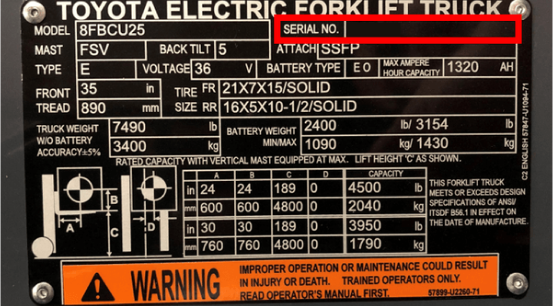How to Find Your Equipment Model Number
Finding the right parts for your equipment is easy when you have your model and serial number which can be found on the data plate. Luckily, a forklift data plate is installed on every truck on the market to help you understand what your forklift can do and provide vital information.
Model Number: The model number of your toyota forklift is extremely important for relaying information to your dealers about repair or technical assistance and for looking up replacements part!
Serial Number: The serial number on your lift is the most important number.The model serial number combination will allow us to provide you with the parts that will fit your particular piece of equipment.

How to Find Your Equipment Serial Number
Finding the right parts for your equipment is easy when you have your model and serial number which can be found on the data plate. Luckily, a forklift data plate is installed on every truck on the market to help you understand what your forklift can do and provide vital information.
Model Number: The model number of your toyota forklift is extremely important for relaying information to your dealers about repair or technical assistance and for looking up replacements part!
Serial Number: The serial number on your lift is the most important number.The model serial number combination will allow us to provide you with the parts that will fit your particular piece of equipment.

Need some help? For further assistance or more information, contact your local Toyota Dealer.

Please click below to sign in to your MyToyota account
Don't have an account?

Where would you like to go?
Optimize Your Business Using Toyota Lean Management

In the world of material handling, we are all on our own lean journey. Recognizing and cutting down on waste is a critical part of any operation, regardless of if you are in manufacturing, warehousing, or any other material handling environment. When you reduce waste, you increase your efficiency, reduce costs, improve throughput, and often find other discernable improvements such as improved employee morale.
What many businesses struggle with is how to go about evaluating and improving the complicated processes that have become ingrained in the way that they do business. After all, they seem to be working, right?
One potential answer is Toyota Lean Management or “TLM”. At its core, TLM provides a framework that allows you to identify and eliminate waste from ANY process – not just ones that are related to material handling.
Toyota Lean Management System – Built on Foundations for Success
TLM utilizes the principles of the Toyota Production System (TPS) to help you accomplish those goals by standardizing processes, reducing waste, and incorporating a culture of continuous improvement. There are always external factors that will impact your business such as the economy or current trends, but one thing you can always control is waste in an effort to become leaner. And TLM gives you the tools you need to identify and reduce waste while incorporating a culture of continuous improvement.
There are seven different types of waste that are targeted by TLM, effectively referred to as “TIMWOOD”. Here is a quick rundown of each to help you understand how they can help you with optimization:
- Transportation – The unnecessary movement of people, information and materials between
- Inventory – Overstock or stagnation of products and materials, producing/storing more products than demanded in the near term, or excess work-in-progress (WIP).
- Motion – Unnecessary movement of people or materials within processes that does not add value to the customer or next process.
- Waiting – People, parts, processes, systems sitting idle or slower than what is required to supply the proceeding process.
- Overproduction – Producing products or services faster than the customer consumes them.
- Over Processing – Adding more to a product or service than the customer needs or is willing to pay for.
- Defects – Any element of a product or service that does not meet the customer expectation.
The worst type of waste is overproduction. This is because overproduction can easily lead to other types of increased waste due to producing too much product, which leads to more waiting, added processing, additional inventory, and transportation, etc.
Eliminating waste is also key to successful optimization before automation. If you are inefficient in how you transport materials, for example, then you will be just as inefficient when you automate that process. Often, the inefficiency is further exacerbated when the process is automated.
Are You Ready to Implement Toyota’s Lean Management System?
If you’re interested in learning more about Toyota Lean Management and how to start your own lean journey, make sure to reach out to your local, authorized Toyota Forklift dealer for more information.